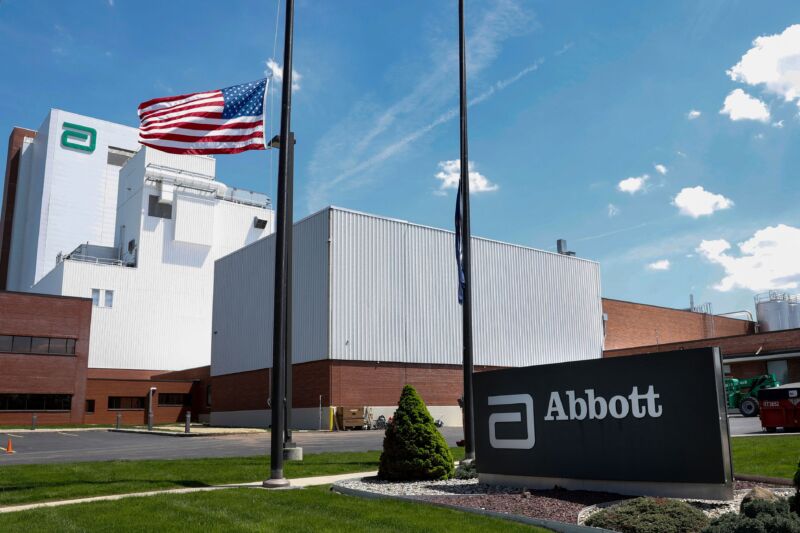
The Department of Justice's consumer-protection branch has opened a criminal investigation into the conduct of Abbott Laboratories, one of the country's largest formula makers at the center of a contamination scandal and ongoing nationwide shortage.
The existence of the investigation was first reported by The Wall Street Journal. Though the DOJ is not commenting on it, a spokesperson for Abbott said the department has informed them of the investigation and that the company is "cooperating fully."Federal regulators last year found numerous violations and "egregiously unsanitary" conditions at Abbott's Sturgis, Michigan, plant, the largest formula factory in the country. The regulators previously received reports that at least four babies who drank formula made at that facility fell ill with dangerous infections of the bacterium Cronobacter sakazakii, which had also been detected in the plant. Two of the infants died.
The Food and Drug Administration had also received a whistleblower complaint that alleged safety violations, falsifications of records, and cover-ups at the facility. But it took several months for that complaint to reach top FDA officials, during which time one infant died and others became ill. The FDA's clumsy handling of the complaint drew backlash from lawmakers and sparked an outside review of the agency.
Meanwhile, Abbott denied that its formula was to blame for the infants' illnesses and deaths. The company argued that the strains of C. sakazakii found in its Sturgis facility did not genetically match a strain found in an open formula container from one of the sick infants' homes, which matched the strain infecting that infant, or a strain found sickening another of the infants. (There is no genetic data on the strains infecting the other two infants.) FDA's food safety experts dismissed Abbot's argument, noting that multiple strains of C. sakazakii were found in the plant and that facility sampling could have easily missed other strains. They also noted that a lack of bacteria showing up in the company's end-product testing is not conclusive; testing tiny amounts of formula batches that are hundreds of thousands of pounds in total is almost always going to miss low-level contamination.
“Unwilling or unable”
The FDA's investigation led to the shutdown of the Sturgis facility last February, which exacerbated a nationwide formula shortage. Parents were left facing bare shelves at stores as they desperately sought food for their children, some of whom required specialty formulas. Federal officials scrambled to boost supply, waiving regulations and tariffs, and flying formula in from abroad. Although the shortage has eased somewhat, supply has not yet recovered. Reckitt Benckiser, the maker of Enfamil, reported in December that it expects the shortage to stretch into the spring.
To get the Sturgis plant back in operation safely, Abbott entered into a legal agreement, called a consent decree, with the FDA last May, which laid out strict steps Abbott would have to take to safely reopen the facility.In an accompanying complaint, the Justice Department laid out a series of violations and failures found at the Sturgis facility, including that the company's own testing revealed an ongoing contamination of C. sakazakii in the facility and that the FDA had issued previous warnings.
"Ongoing inadequacies in manufacturing conditions and practices at Defendants’ facilities demonstrate that Defendants have been unwilling or unable to implement sustainable corrective actions to ensure the safety and quality of food manufactured for infants, a consumer group particularly vulnerable to foodborne pathogens," the department wrote.
The Wall Street Journal notes that the department has successfully prosecuted other food companies and their executives for introducing contaminated food onto the market. In 2020, for instance, ice cream company Blue Bell paid $19 million and pleaded guilty to shipping contaminated ice cream tied to a Listeria outbreak that killed three. In 2015, the former owner of Peanut Corp. of America, Stewart Parnell, was found guilty on numerous charges related to a Salmonella outbreak that killed nine and sickened more than 700 others. He was sentenced to 28 years in prison.
reader comments
86